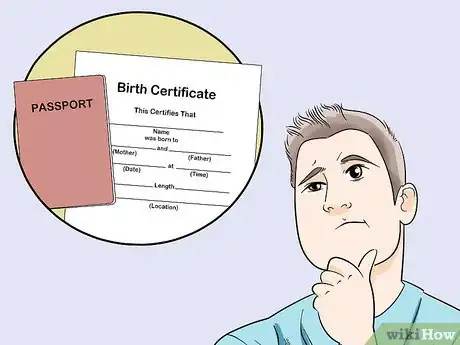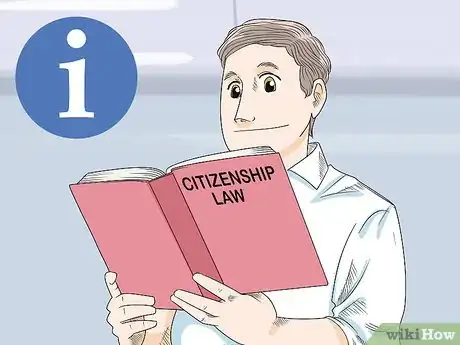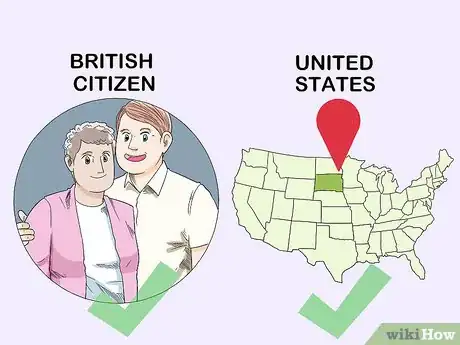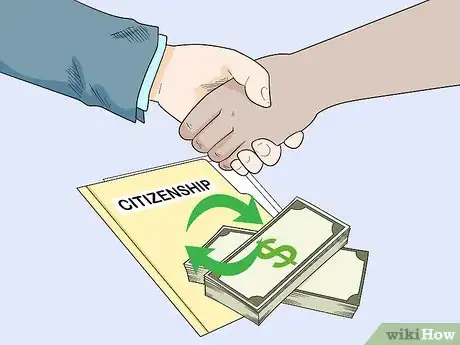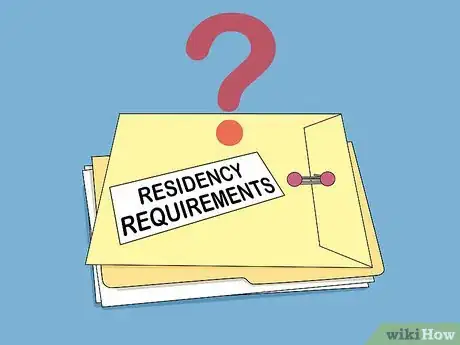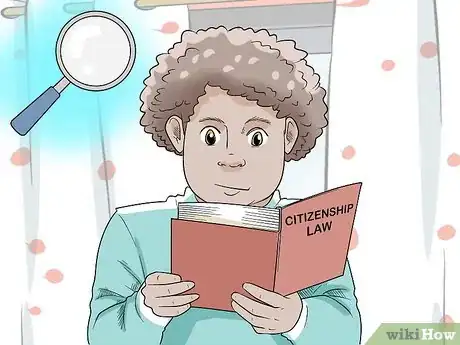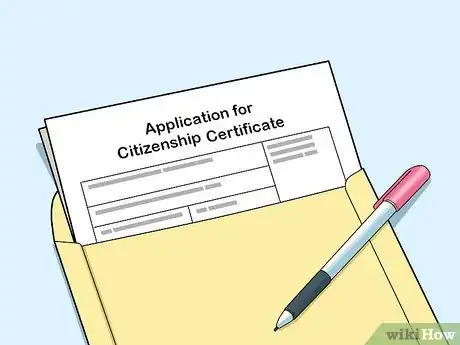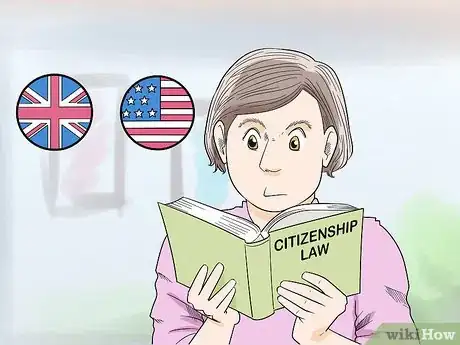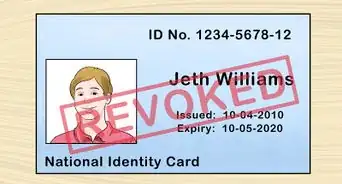This article was co-authored by Clinton M. Sandvick, JD, PhD. Clinton M. Sandvick worked as a civil litigator in California for over 7 years. He received his JD from the University of Wisconsin-Madison in 1998 and his PhD in American History from the University of Oregon in 2013.
There are 15 references cited in this article, which can be found at the bottom of the page.
This article has been viewed 525,297 times.
With the exception of 'stateless persons' (those individuals without citizenship ties to any state), every person is a citizen of at least one state.[1] You may have become a citizen at birth if your state grants citizenship to people born within its territory. You might also be a citizen if your country grants its citizens' children citizenship at birth regardless of where the children were born. You can also become a citizen through naturalization, which involves an application process and other criteria, such as a certain number of years of residence, marriage to a citizen, or financial investment. If you are interested in gaining dual citizenship, then there are several options you can look into.
Steps
Obtaining Dual Citizenship Through Birthplace
-
1Consider whether your country of birth grants you a second citizenship. Were you born in a state whose right to citizenship you have never exercised? If so, then you might be eligible for citizenship through an unrestricted right of soil, also known as unconditional jus soli. This means that you have an automatic birthright to be a citizen of that country because you were born there. For example, if you are currently a British citizen who was born in the United States, you are entitled to American citizenship through unrestricted jus soli.[2]
- Research the immigration laws of your country of birth. Most countries do not grant citizenship through right of soil, so it is important to research the laws of the country in which you were born.[3]
- 30 of the world's 194 countries practice unconditional jus soli.[4] Of these 30 countries, Canada and the United States (as of 2010) are the only countries among the world's advanced economies that practice unconditional jus soli and grant citizenship to most children born on its soil, including children born to persons present in the state illegally.[5]
- However, children born in the United States to foreign diplomats and foreign heads of state do not acquire citizenship through right of soil.
-
2Find out how to exercise citizenship through unrestricted right of soil. You may find that your country of birth, which is not the country whose citizenship rights you exercise, grants you a right to its citizenship through a right of soil. If so, discover how you can exercise that right.
- One way to exercise a right to citizenship is to apply for a passport. You can apply for a passport through the state's embassy or consulate in your current country of citizenship and/or residence. You may be asked to present an original or certified copy of your birth certificate to the consulate or embassy as evidence.
- For example, if you apply for a Canadian passport, then you can present a birth certificate issued by the Canadian province or territory in which you were born. This serves as evidence of your Canadian citizenship because Canada practices unrestricted jus soli.[6]
Advertisement -
3Research the laws of both states regarding dual citizenship. Find out the laws regarding dual citizenship of both the state of your current citizenship and of the state whose second citizenship you are trying to obtain. Consider whether enforcing your right of soil citizenship may require renouncing your current citizenship. This is important because not all states that practice unconditional jus soli permit their citizens to hold dual citizenship.
Obtaining Dual Citizenship Through Parentage
-
1Consider your parents' citizenship. Most countries in the world grant citizenship on the basis of right of blood or jus sanguinis. Under the jus sanguinis principle, you acquire one or both of your parents' citizenship upon birth.[10] This means that the child acquires the parents' citizenship regardless of where she is born, and her only citizenship is the one acquired through right of blood if she is born in a country that does not practice jus soli.
- For example, if you were born in the United States, but your parents are both British citizens, then you are also a British citizen.
-
2Research the laws regarding dual citizenship of both countries. Find out if obtaining a second citizenship through the jus sanguinis principle of a state would require you to renounce your prior citizenship. If that is the case, you cannot become a dual citizen.
-
3Find out how to exercise your citizenship through right of blood. The process that you will need to follow to gain citizenship through parentage will vary by country. Check with the country's consulate to determine what you will need to do.
- For example, if you are currently an American citizen who was born to British parents, and you are under the age of 18, it is your parents who must apply on your behalf to register you as a British citizen. The application form and guidance on how to register as a British citizen in this scenario are available here.
Acquiring Dual Citizenship by Investment
-
1Consider acquiring a second citizenship by investment. Many countries issue resident visas or permits to individuals who are willing to invest in the country's economy, and those resident visas can make you eligible for citizenship after a few years. This can be an expensive route as the minimum investment amounts range from several hundred thousand dollars to several million dollars.[14]
- For example, the United States requires an investment of $1 million (or $500,000 if you are investing in a high unemployment or rural area), and in return you receive a conditional permanent resident permit.[15]
-
2Find out how long it will take to become a citizen by investment. This path to citizenship can take a long time, so research the amount of time that it will take you to become a citizen before you decide to invest.
- For example, the United States and Belgium grant citizenship after five years of holding a resident permit of this type. However, Malta (whose minimum investment requirement is EUR 1 million) grants citizenship after only 1 year.
-
3Check to see if there is a residency requirement. Some states that grant investor visas also require that you remain a resident in that state before you can become a citizen. However, not all countries have residency requirements.
- For example, Cyprus does not have a residency requirement but the United States does.[16]
-
4Check the citizenship laws of the country in which you are investing. Not all countries permit dual citizenship. You may be required to renounce your prior citizenship in order to acquire citizenship by investment. If that is the case, you cannot become a dual citizen in this way.
Acquiring Dual Citizenship by Marriage
-
1Consider your spouse's citizenship. If you are married to someone who holds a citizenship that you do not, then you might consider whether your spouse's country of citizenship grants you citizenship by marriage. This process involves applying for a resident permit that you would qualify for based on your marriage. You would also need to meet any residency requirements.
- If you believe that you can acquire a second citizenship through marriage, research the laws of your spouse's country of citizenship regarding citizenship by this route. The laws about the application process and amount of time involved to obtain citizenship will vary by country.
- For example, if you are married to a British citizen, you must meet certain requirements before you can apply to become a British citizen by marriage. You must be 18 years of age or older, of sound mind, of good character (e.g. you don't have a serious criminal record), you must meet English language requirements and show knowledge of life in the UK, you must have been granted indefinite permission to stay in the UK, and you must meet a residency requirement.[17]
-
2Beware of the consequences of sham marriages. Note that entering into a sham or fake marriage for the sole purpose of acquiring residency and (subsequent citizenship) of your spouse's country is considered fraud and is a serious criminal offense in most countries. Do not attempt to enter into a sham marriage for the purpose of becoming a dual citizen, as the legal consequences of this can be severe.[18]
-
3Confirm the laws regarding dual citizenship of both countries. Not all countries permit dual citizenship, and your spouse's country of citizenship may be one that requires you to renounce your previous citizenship. If that is the case, then you cannot become a dual citizen through marriage.
Acquiring Dual Citizenship by Other Means
-
1Apply for an employment visa. You may also gain citizenship by applying for a job in another country. Some countries allow individuals who have legally entered the country on a work visa to convert their visa status to permanent residency and then to citizenship.
- For example, in Australia you can apply for a number of categories of employment visas that have their own requirements. One type is called a Skilled-Independent Visa and it allows you to enter Australia with the intention of working in Australia as long as you meet the criteria. If you spend four consecutive years in Australia under the visa, then you become eligible for Australian citizenship.
-
2Apply for residency through special immigration programs. In many countries, the first step to becoming a citizen is to apply for residency. Once you become a resident, you may then apply for citizenship through naturalization. Eligibility requirements vary from country to country.
- For example, in the United States you can qualify for permanent residency through the Diversity Immigrant Visa Program. This program randomly draws from a pool of individuals who are from countries with low rates of immigration to the United States.[19]
- Check to see if the country in which you are interested in acquiring a second citizenship has a similar route to acquiring residency.
- Once you acquire residency and meet any other criteria, then you can apply for citizenship.
-
3Confirm the laws regarding dual citizenship of both the countries. Keep in mind that not all countries permit dual citizenship. If you acquire citizenship of a state through a work visa, visa lottery, or other program, then you may be required to renounce your prior citizenship. If that is the case, you cannot become a dual citizen by following this route.
References
- ↑ http://www.unhcr.org/pages/49c3646c158.html
- ↑ http://www.uscis.gov/policymanual/HTML/PolicyManual-Volume12-PartH-Chapter3.html
- ↑ http://www.cis.org/sites/cis.org/files/articles/2010/birthright.pdf
- ↑ http://www.cis.org/sites/cis.org/files/articles/2010/birthright.pdf
- ↑ http://www.cis.org/sites/cis.org/files/articles/2010/birthright.pdf
- ↑ http://www.cic.gc.ca/english/passport/apply/citizenship-proof.asp
- ↑ http://www.refworld.org/pdfid/3ae6b4ffa.pdf
- ↑ http://travel.state.gov/content/travel/english/legal-considerations/us-citizenship-laws-policies/citizenship-and-dual-nationality/dual-nationality.html
- ↑ http://www.cic.gc.ca/english/helpcentre/answer.asp?q=356&t=5
- ↑ http://www.cis.org/sites/cis.org/files/articles/2010/birthright.pdf
- ↑ http://travel.state.gov/content/travel/english/legal-considerations/us-citizenship-laws-policies/citizenship-and-dual-nationality/dual-nationality.html
- ↑ https://www.gov.uk/dual-citizenship
- ↑ http://www.mfa.gov.sg/content/mfa/overseasmission/xiamen/consular_services/citizen.html
- ↑ http://www.best-citizenships.com
- ↑ http://www.uscis.gov/green-card/green-card-through-job/green-card-through-investment
- ↑ http://www.best-citizenships.com
- ↑ https://www.gov.uk/becoming-a-british-citizen/if-your-spouse-is-a-british-citizen
- ↑ http://www.nolo.com/legal-encyclopedia/free-books/fiance-marriage-visa-book/chapter1-6.html
- ↑ http://www.uscis.gov/green-card/other-ways-get-green-card/green-card-through-diversity-immigration-visa-program/green-card-through-diversity-immigrant-visa-program
- ↑ http://travel.state.gov/content/travel/english/legal-considerations/us-citizenship-laws-policies/citizenship-and-dual-nationality/dual-nationality.html
- ↑ http://travel.state.gov/content/travel/english/legal-considerations/us-citizenship-laws-policies/citizenship-and-dual-nationality/dual-nationality.html
About This Article
To obtain dual citizenship, check if you were born in another country, which may allow you to apply for a second citizenship in addition to the one you already have. If this doesn’t apply to you, find out your parents’ citizenship, since most countries grant citizenship to the children of their citizens. Another way to gain dual citizenship is to check whether your spouse’s country of citizenship will let you become a citizen through marriage. Keep in mind, however, that your country of citizenship may not allow dual citizenships, so make sure to check your country's laws first. For tips on how to secure dual citizenship by investing money in another country, keep reading!

